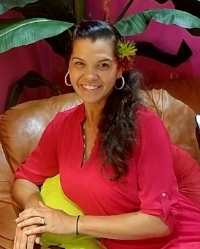Dr. Claire Kuuleilani Hughes
-- By Lisa Ma
Our guest speaker for the July OWL meeting was Dr. Claire Kuuleilani Hughes. Dr. Hughes has been an advocate for Native Hawaiian Health for over 30 years. She became the state’s first Native Hawaiian registered dietician in 1959. Dr. Hughes was appointed the chief of nutrition at the State of Hawaii Department of Health. Her work to promote a more traditional Hawaiian diet and health programs for the Hawaiian community earned her the recognition as one of Hawaii’s Living Treasures by the Honpa Hongwangi Mission of Hawaii in 2011. She shared her views on legacy and her fascinating research in what became the Molokai Diet.
Claire began her talk with a discussion of legacy. She shared the stories of three women she felt provided a strong legacy in the Hawaiian culture:
- Anna Rice Cooke – art enthusiast and collector and the founder of the Honolulu Academy of Arts
- Queen Liliuokalani – gifted songwriter including Aloha ‘Oe and best known for her philanthropic gift of a trust for orphans and destitute children in Hawaii
- Bernice Pauahi Bishop – lands used to fund and establish Kamehameha Schools
Dr. Hughes believes her legacy is built by hard work and doing a good job. In addition, her driving principles are:
- Act according to professional standards
- Choose how to accomplish the job
- Judge outcomes constantly
- Do things outside employment
- Take pride in accomplishments
It was long known that the Native Hawaiian population suffered from health issues that caused them to have a shorter life expectancy. In the late 1980’s , Dr. Hughes worked with Doctors Emmett Aluli and Kekuni Blaisdell to study the high incidence of cardiovascular disease, hypertension and diabetes in Native Hawaiian people. The common factor was diet and with her background, Dr. Hughes was specifically requested to come to Molokai to assist with the study. The participants were taken off the high fat diets they were consuming and ate only traditional Hawaiian foods. The goal was not to lose weight. They wanted the improvement in health to come from diet, not weight loss. In 4 weeks’ time they saw a 20 point drop in cholesterol. Dr. Hughes shared with us a comparison chart on the Molokai Diet versus an American diet. 78% of the calories on the Molokai Diet come from carbohydrates including taro, rice, potatoes, vegetables, fruits and seaweed.
Besides her important work on this study, Dr. Hughes also helped to secure federal funding for culturally-based health and nutrition programs for Native Hawaiians. Dr. Hughes was part of a panel that testified before the U.S. Senate resulting in Congress passing the Native Hawaiian Health Care Act of 1988.










